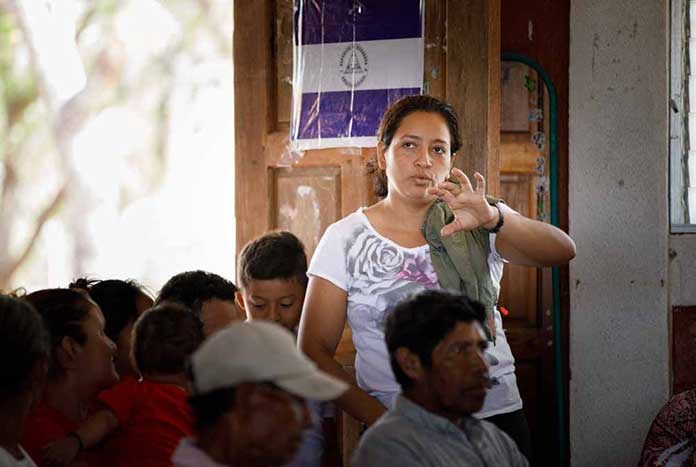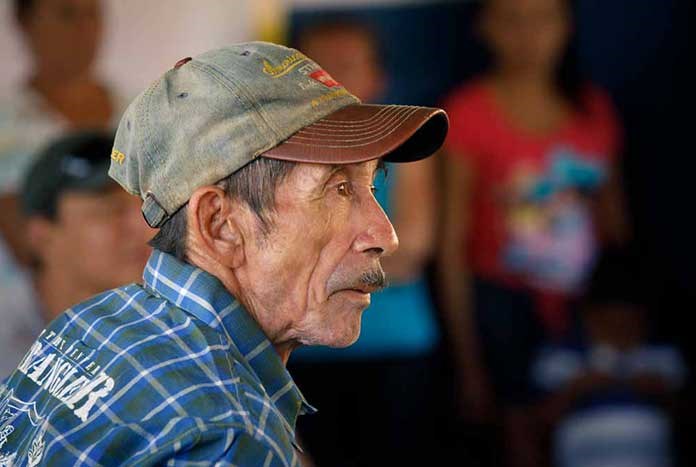“Farmers proudly brought some of the fruits and vegetables they had managed to produce this harvest, many of which they had not been able to farm before. One farmer from a community in the Boaco communities proudly showed off his crop of tomatoes, which was a first for him, in such a dry region where they are generally not easy to grow.” Katie Hagley writes about how communities in Teustepe, Nicaragua are beginning to thrive.
Every year, farmers from villages supported by CEPAD come together for the National Forum of Farmers.
“As community leaders, we know our needs.” Johana, Community Member, San Diego
CEPAD’s programmes are rooted in the strength of community organisation and training and the belief that communities themselves must identify their own needs.
The community of San Diego and six other communities that Amos Trust is supporting are early on in their 5-year journey with CEPAD — to build their resilience in the face of climate change.
Every year, in late November, farmers from all 40 villages supported by CEPAD come together for the National Forum of Farmers. At the most recent forum, the CEPAD team was encouraged to see the high levels of learning and development for the farmers participating, even after just one year.
Farmers proudly brought some of the fruits and vegetables they had managed to produce this harvest, many of which they had not been able to farm before. One farmer from a community in the Boaco communities proudly showed off his crop of tomatoes, which was a first for him, in such a dry region where they are generally not easy to grow. He was helped by the water conservation techniques (micro-dams and water reservoirs) that he had been trained to use, which are already creating life-changing improvements in what farmers can produce.
A particularly active group of young people in the Boaco communities has already started adapting the training and delivering it themselves to other young people.
In addition to agricultural training, women have received entrepreneurship training from CEPAD and grants to help their small businesses to get going. As a result, women sell bread, second-hand clothing, and even prepaid cards with phone credit to ensure their enterprises fit their community’s needs. In addition, young people have been participating in conflict management training, looking at how to address family violence and support others after a crisis (e.g. landslides, or hurricanes). A particularly active group of young people in the Boaco communities has already started adapting the training and delivering it themselves to other young people — multiplying the impact of CEPAD’s transformational work.
For much of the year, CEPAD has also provided emergency relief to families affected by two catastrophic hurricanes that hit at the end of 2020, including food support (since an estimated 70% of Nicaragua’s bean crop was destroyed), water purification filters (part-funded by Amos Trust supporters) and help for hundreds of families with zinc sheeting to repair their damaged roofs. In addition, they continue to monitor and support the communities affected.

Community: A young woman in Barranco Alto in Nicaragua — one of seven new communities that Amos Trust is supporting through our partner, CEPAD
— — — — — — —
Angela, 22, lives in San Diego, one of the seven communities we are supporting, with her husband, her 5-year-old daughter and her baby son. She and her young family benefited from CEPAD’s community support during last year’s heavy rains and subsequent drought.
“During the heavy rainy season, our tiny house got leaks, and our clothing got soaked. During that time, I felt bad, very bad, hopeless. I had my daughter, and I was pregnant. Our bed got drenched from the first rains; we had to sleep on the wet beds for two days until it was possible to dry them in the sun. But now, we have new zinc sheets that we received from CEPAD, and we were able to improve our roof. Hopefully, our clothing will not get flooded anymore.
Angela’s husband is a hired worker on farms, planting in the fields, but there has been limited work due to the drought. However, she said, “We also received food support, and it came just at the right time; there is a lack of jobs in the region because of the late rains. My husband works as a day labourer in the fields; the dry conditions in the area make it harder to find jobs. He usually works planting or cleaning for other farmers’ but the lack of rain limits access to jobs.
I want to become stronger and to raise my children; my desire is to improve my little house and provide a better shelter for my children so they can sleep safely and live in better conditions.”
— — — — — — —
Find out more about our partner CEPAD in Nicaragua

















